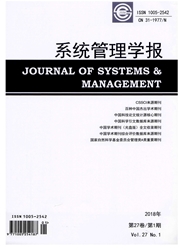

 中文摘要:
中文摘要:
公平偏好作为参与者具有的一种行为决策偏好,对企业之间的合作行为具有重要影响。为了提高产业转移驱动下欠发达地区企业的创新合作水平,基于公平偏好理论,通过模拟构建欠发达地区企业合作创新网络,利用演化雪堆博弈模型从企业的公平偏好类型、网络结构和节点类型对欠发达地区企业创新合作的涌现问题进行研究。研究表明,公平偏好类型在企业博弈合作损益比的约束下对网络合作行为涌现产生影响,其中避免不公平偏好更有利于促进网络合作行为的涌现;网络平均度的增加有利于促进网络合作行为的涌现,中心节点比中介节点对网络合作行为涌现有更重要的影响力;中心节点不仅能够有效抵抗背叛者对网络的入侵,而且当网络中的企业具有避免不公平偏好时能够对网络合作行为的涌现产生最大的影响。
 英文摘要:
英文摘要:
As a preference in behavioral decision-making,fairness preference has a strong influence on the cooperation among firms.To improve the firms' ability of cooperative innovation in the underdeveloped areas,driven by the industrial transfer,this paper simulates and constructs the firms' cooperative innovation network in the underdeveloped areas,and uses the evolutionary snowdrift game model,based on the fairness preference theory,to study the emergence of cooperative behavior in the network from the perspectives of types of firms' fairness preference,network structure and node type.The results show that,under the restraint of gains and losses of the firms' cooperation in evolutionary snowdrift game,the types of fairness preference affect the emergence of firms' cooperation in the network and the preference of avoiding unfairness has the most important influence.The increase of network's average degree is beneficial to promote the emergence of firms' cooperation in the network.In addition,the hub node has greater impact on the firms' cooperation compared with the intermediate node.Moreover,the hub node not only can effectively resist the defectors' invasion of network,butalso has the strongest impact on the firms' cooperation in the network when the firms have the preference of avoiding unfairness.
 同期刊论文项目
同期刊论文项目
 同项目期刊论文
同项目期刊论文
 期刊信息
期刊信息
